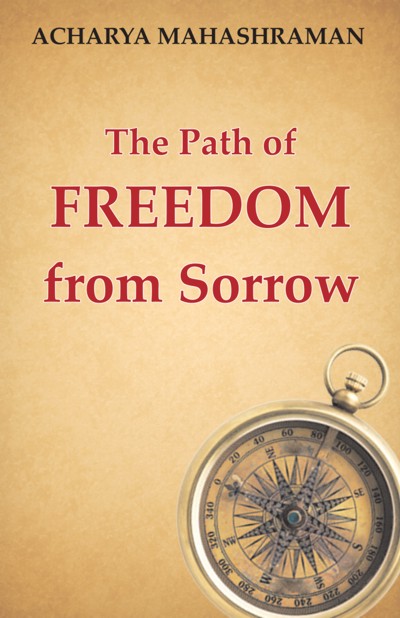To rule others is a common thinking of each human. Man, normally, wants to be possessive for other people. This psychology, of ruling others, if transformed and an effort is made towards ruling the self, instead of others, and then the technique to control over self can be developed.
There are several ruling techniques such as autocracy, democracy and many more. The ruling system is always concerned with other people. In the matter of ruling over the self, the system of self-discipline works. Such is the difference between spiritual and political world. Politics runs on the maxim of 'dushtasya dande, sujansya pooja' - it means an evil should be punished and good should be respected. In the spiritual world, man focuses on the self only. He thinks of the evil and good residing only within himself. An eye for an eye can be the philosophy of political world. Even a common man can also have the same principle in his life. Conversely, a person, who has the purpose of purifying the self and wants to move forward in spiritual practices, will follow the phrase-behave friendly with an enemy too.'
Who is an enemy? Agam defines it as -'appa mittamamittam cha, duppatthiya suppatthio.' The soul occupied in vicious acts is his enemy and the same involved in virtuous action is his friend. To behave friendly with a person even who behaves adversely, ungraciously and harmfully, is a great spirituality. Only great person can behave in such a manner.
Once, the president of United States of America was advised - 'Now you are in power, why don't you finish your enemies?' The president replied-'Yes, I am doing the same.' Adviser asked him again-'Where are you finishing your enemies. Instead, you are behaving graciously with them.' The president responded -'I am trying to wipe off the enmity through my amity.' Very few people can live with such thoughts. Only an extraordinary person can have friendly, loving and compassionate behaviour with the person who is behaving unfriendly
The anger arises when a person does something wrong and harm others. If one becomes angry on the person doing mistakes then why does he not get upset with 'the anger' caused by the self? If anger, caused by the self, becomes unpleasant to him and the effort is made towards quitting it, then surely the person can move on the path of spirituality. After all, what is the benefit of getting angry? A wise man should always think of pros and cons in his each action. What will I gain after doing it or what will be the harm? Which one is more effective? He should go for an action which results into gain only and no loss. If the gain is more than the loss, then also that work can be done. Conversely, if the loss is more than the gain, or no gain, then a wise man should not do that. Sanskrit literature describes the same: alpasya hetoh bahu hatumichhan vichar mudhah pratibhasi me tvam
i.e. The person, who rejects more because of less gain, is vacuous and foolish.
Man wants to achieve more in his short life. He wants to be something and desires to do a lot. He longs for becoming a wealthy person. He should think that if the most of the span of his life or the entire life goes on making money then when will he earn the prosperity of the soul?
Soul and the body are two different entities. The soul is eternal while body is perishable. If the equal amount of time and effort is put for the immortal soul as is being put for this mortal body, man can achieve a higher state.
The question arises 'how can a soul be permanent?' The soul has innumerable pradesha (atoms). Of all the atoms, not a single will destroy, drop off or disperse. The soul will always have the same number of atoms. Not a single atom will be added or reduced. The soul had the same number of atoms in the previous infinite years. It has the same number today and will have the same in future. For this reason, the soul is eternal. But the system of the body works differently. The condition of the body gets changed after some time. We do not know the number of the atoms going out and coming in the body. One day the body will be perished and destroyed. Therefore, the body is impermanent. It is unknown to us. No one knows that when he is going to die. All of sudden it says good-bye. Soul and the body get separated. That's why a man should always be aware. One must try to maintain the purity of soul and serenity of wisdom.
If the soul is pure and wisdom is awakened one can stay safe from many sins and make progress in the field of spirituality. An awakened consciousness should think whether his desires are getting cut down or not? Desires are obstacles in spirituality. Uncontrolled desires may interrupt the spiritual practice. If desires are controlled, then spiritual practice moves forward.
Five maxims of spiritual practice:
- Mind-body Harmony (Bhav-kriya)- Mind-body Harmony means to get consciously involved in the work at hand. After being perfect in it, Meditation can be practiced during walking or any other activity. If the focus is only on walking without any thought, memory and imagination the walking itself becomes Meditation. Bhav-kriya is a live action. The action, where mind and body are not together, is dead. The work is done efficiently when action is done mindfully. An action without awareness can be incomplete. Therefore, for the successful completion of the work and spirituality, Bhav-kriya is necessary.
- Restraint of Reaction (pratikriya virati) - Man should try to stay free from the reactions. He should listen to the words, understand and analyse the situation while staying indifferent instead of doing immediate reaction. If man learns to perceive and know the incident as an observer and he does not become influenced, it is a great sadhana.
- Universal Amity (Maitri) - Many times the words 'moha' (delusion) and maitri are confused in the meaning. But these two words are different from each other. Amity does not necessarily include attachment. A person can also have amity while practicing for detachment. Thinking of others progress and welfare is amity. Moha or attachment happens for a particular person - that person is my brother, mother or father etc. Amity is never limited to a particular individual. It has vast form. Any living being should not get hurt by me- is the thought resulting from amity. Another form of amity is not to do evil for anyone and if possible try for others welfare and guide the right way.
Some great real examples of using amity are: -
To make someone stable on the path of spirituality, to make a person free from addiction if he is doing and establish someone from life of consumerism to restraint, to help someone getting peace who is physically sick and mentally stressful, and to do good for the person who does harms. Our amicable behaviour can sometimes force someone to think positive and get himself transformed.
- Restraint of food (Mitahar) - A spiritual practitioner should have control over what he eats. He should not eat much which can disturb his Sadhana. Moreover, he must avoid the food that harms his health. He should choose the food that keeps him healthy and helps in Sadhana. Some examples of putting restrain on food are: 1. eat less than the hunger (unodari), 2. limit the number of food items in a day, 3.1imit the quantity of sugar, dairy and oil product (vigaya). Fasting (upwas) is also good for health.
- Restraint of Speech (Mit Bhashan) - Talking moderately is essential for sadhana. Sadhana can get hindered if we have no control over talking. A talkative person is prone to speak anytime and anything that can cause increase in attachment and hate. A spiritual person is that who first analyses before he thinks. He thinks before he speaks. Though it is necessary to talk in pragmatic life, yet complete silence is not possible for everyone. But not speaking unnecessary should be determined by a spiritual practitioner.
The practice of these five maxims can strengthen the sadhana. The 32nd chapter of Uttradhyayan Sutra describes as:
je indiyanam vis ay a manunnan na tesu bhavatn nisire kayai na yamanunnesu manam pi kujja samahikame satnane tavassi
The sensual objects may be favourable as well as unfavourable. If the perspective is developed as an observer, spiritual person would never have any reaction for any object or for a situation. A purposeful practice can reduce the degree of attachment and hate considerably. Consequently, he can make progress towards the door of liberation.
 Acharya Mahashraman
Acharya Mahashraman
